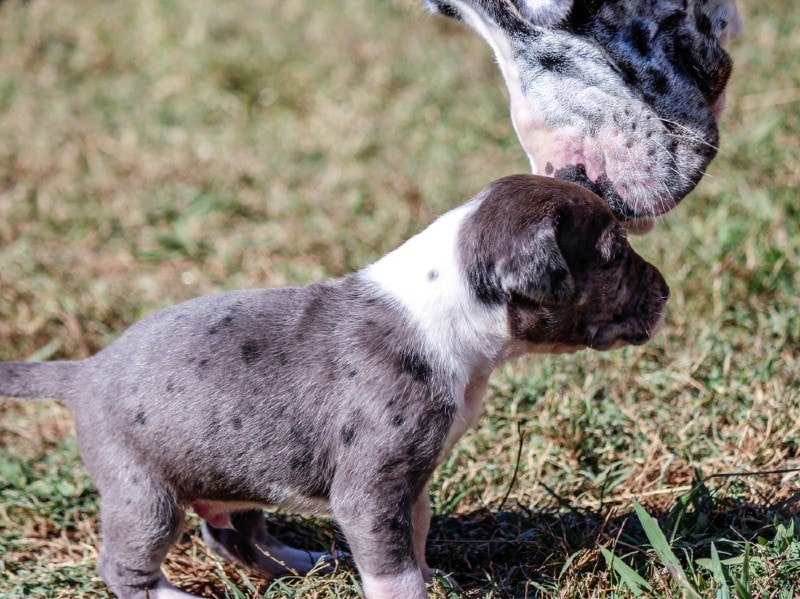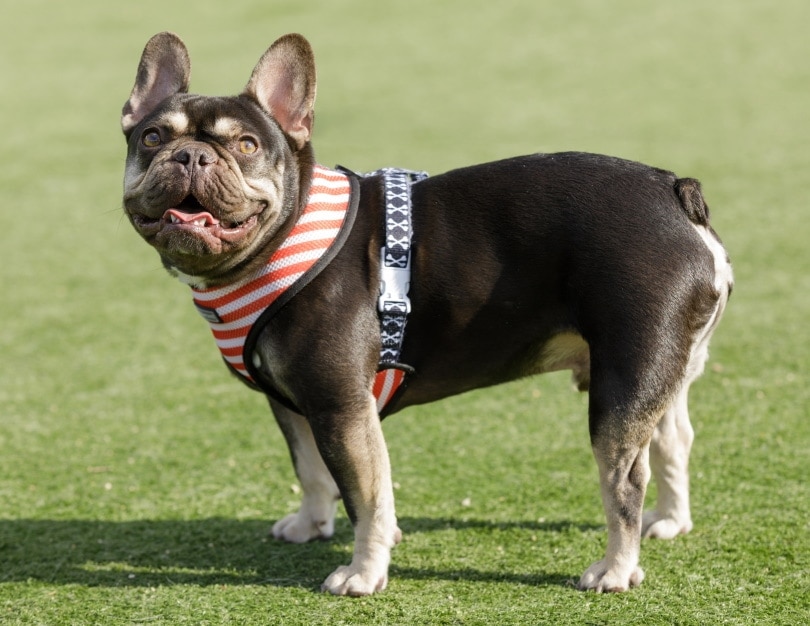Why Do Boston Terriers Fart So Much? 5 Common Reasons
Updated on

The Boston Terrier is a charming little breed that will win you over with its cuteness, friendliness, and happy-go-lucky personality. These comical little dogs will keep you laughing all day and then turn into the perfect snuggle buddy by night. There’s one problem though—and it’s all the farts!
Boston Terriers are notorious for being able to clear a room with their gassiness. Whether they are loud and obnoxious or silent but deadly, this breed certainly lets them rip. Here, we are going to talk more about why these adorable dogs come with such stinky behinds.
The 5 Reasons Why Boston Terriers Tend to Be Gassy
1. Brachycephaly
Owners of Boston Terriers and other brachycephalic breeds know all too well how much gas their dogs can emit. This is because their short snouts restrict the airflow into the nostrils when the dog breathes, causing them to work harder to breathe as they eat.
All of the air ingested as they work to breathe ends up in the stomach and the digestive system, ultimately leading to excessive flatulence that can easily clear a room. Combating lots of farts that are due to brachycephalic face shape can be difficult since breathing difficulty is an unfortunate result of having a shortened snout.
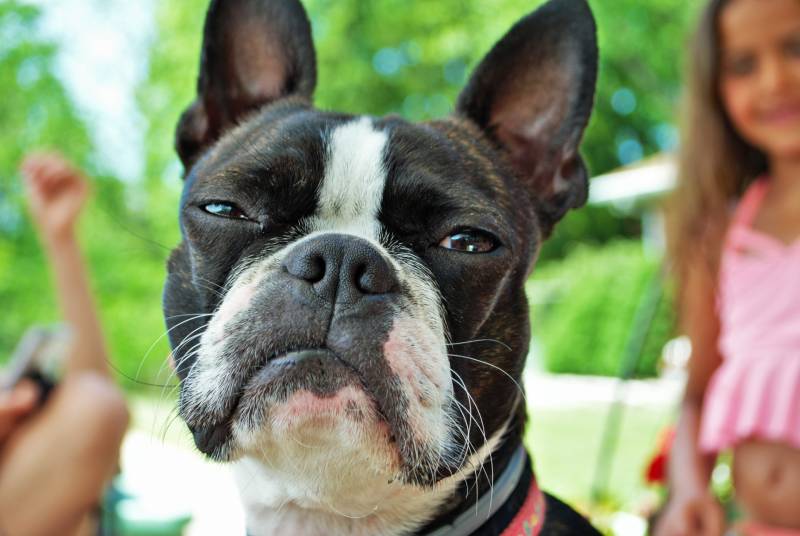
2. Diet
Diet can play a large role in certain digestive disturbances, so you will want to ensure you are feeding your Boston Terrier a well-balanced, high-quality diet that suits their needs. Here are some of the reasons their diet could be the culprit for those smelly farts:
Dietary Changes
A dog’s stomach can be very sensitive and drastic changes in their diet can lead to many gastrointestinal symptoms such as gas, loose stool, and an upset stomach. If you need to change their diet in any way, you will want to do a slow transition rather than making an immediate change.
There’s typically no need to be alarmed if your dog gets gas due to a food swap but if symptoms persist for weeks, it’s a good idea to reach out to your veterinarian. It’s also highly recommended that you speak to your vet before making any changes to their diet in the first place.
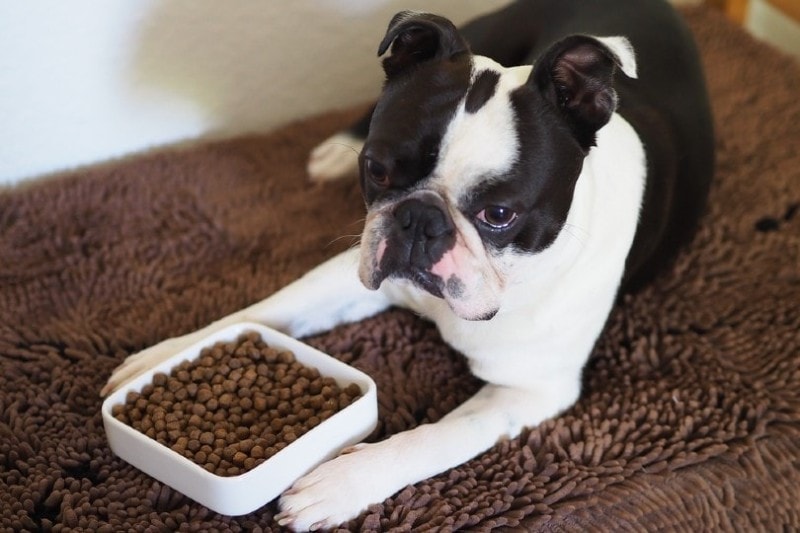
Table Scraps
It’s never a good idea to feed a dog table scraps. Not only does it lead to begging behavior, which can be hard to rectify, but it’s not good for their health. Table scraps and other human food commonly result in digestive issues for dogs, including lots of farts.
A dog’s system isn’t designed to digest a human diet and many table scraps are full of sugar, carbohydrates, and fat. Other signs your dog may exhibit after dining on table scraps are vomiting, diarrhea, and nausea.
Most dogs are also lactose intolerant and anything containing dairy products will likely result in stomach upset. Foods containing fermentable fibers such as lactulose, psyllium, or oat bran can also lead to gas and digestive upset. Other common culprits include spoiled foods, spicy foods, and food additives.
Food Ingredients
Most of us can relate to food that makes us a bit gassier than others and there are plenty of ingredients in dog foods that could lead to excess gas including beans, peas, soy ingredients, and even fish like salmon or menhaden fish.
It’s hard to tell what the culprit could be, that’s why it’s a good idea to pay close attention to the ingredients in your dog’s food, monitor their health, and only make dietary changes slowly.
3. Food Allergies or Intolerance
Boston Terriers are no strangers to food allergies and they can develop an allergy to a particular food at any time in their life. Any food ingredient has the potential to result in an allergy, but proteins are the most common culprit.
Dog food ingredients like dairy, beef, chicken, chicken eggs, soy, or wheat gluten are among the most common sources of food allergens in dogs. Food allergies lead to many uncomfortable symptoms from itchy skin, recurring skin and ear infections, and gastrointestinal upset. However, it is important to note that while Boston Terriers do seem more prone to food allergies these are still quite rare. Food intolerance is more common.
To treat your dog for a food allergy you will first have to identify the allergen, which is typically done via an elimination diet that is supervised by your veterinarian. If symptoms result during this elimination diet and then return once you reintroduce the normal food, your dog has a food allergy.
Once the allergen is identified that ingredient should be removed from your dog’s diet permanently. There are blood tests that can assist with the diagnosis, but these tests may not be as accurate as the food elimination trials.

4. Eating Too Quickly
In addition to their short snouts causing them to ingest air as they eat, your Boston Terrier could also be eating too quickly, which also leads to the ingestion of excess air.
Certain dogs like to gulp down their food, which causes all that food and air to expand in the stomach. As it makes its way through the intestines, it ultimately comes out the back end.
If your dog eats incredibly fast, it’s a good idea to check with your veterinarian to rule out any parasites, nutritional deficiencies, or any other underlying medical condition that could be causing this.
Once you’ve ruled out anything health-related, you can try a few methods to get them eating more slowly. This includes feeding more frequent, smaller meals throughout the day, using a slower feeder bowl, or even feeding through a puzzle toy.
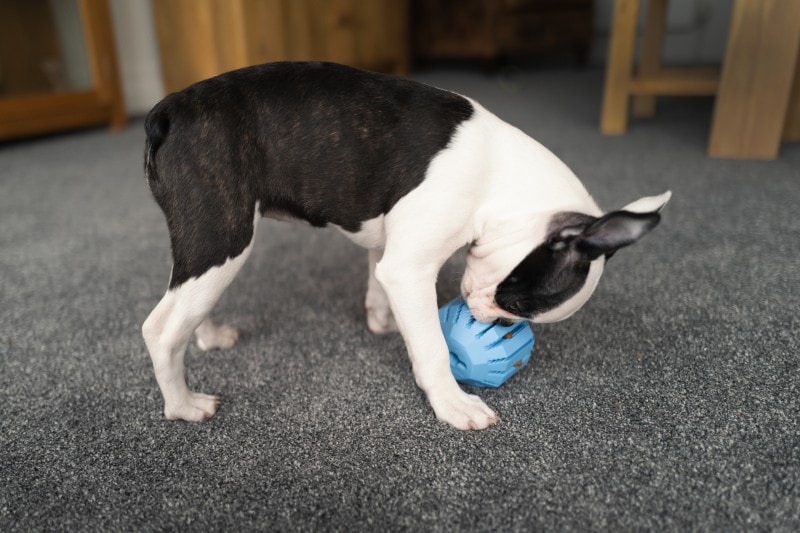
5. Underlying Medical Issues
Underlying medical issues could also be the reason your Boston Terrier is farting so much. This includes acute or chronic intestinal ailments or other forms of gastrointestinal disease. If excess flatulence is related to an underlying health condition, there will generally be more signs of the condition present including diarrhea, vomiting, loss of appetite, weakness, and more.
- Inflammatory bowel disease
- Small intestinal bacterial overgrowth
- Irritable bowel syndrome
- Intestinal parasites
- Enteritis
- Exocrine pancreatic insufficiency
- Tumors
Tips for Preventing Boston Terrier Farts
There’s no way around it—a dog that farts constantly can be problematic for a household since the smell is incredibly unpleasant. There are a few things you can do to help minimize your Boston Terrier’s gas, though.
- Encourage an active lifestyle.
- Feed your dog a highly digestible diet.
- Feed smaller meals more frequently.
- Rule out any potential health conditions or food allergies.
- Feed meals in a quiet, isolated area away from other pets.
- Try slow feeders or puzzle toys if eating too quickly is the culprit.
- Ask your veterinarian about changing the protein source in their food.
 When Should I Call My Vet?
When Should I Call My Vet?
If your dog is suffering from chronic, pungent gas more than a few times a week, it’s a good idea to get in contact with your veterinarian to help identify the root cause. You should contact them immediately if excess gas is accompanied by any other alarming signs including:
- Vomiting
- Diarrhea
- Lethargy
- Upset stomach
- Lack of appetite
- Weight loss
- Bloated abdomen
- Blood in the stool
Your veterinarian will work with you to figure out the root cause of your Boston Terrier’s gas problem. Once you figure out why you can start working to make any necessary changes. Your vet may also recommend certain medications or supplements to help alleviate gas including probiotics, dry activated charcoal and special diets.
Conclusion
It’s no secret that Boston Terriers are a bit gassy. While it could just be related to the fact that they are a brachycephalic breed that naturally ingests more air as they eat, several other reasons could be the culprit to that never-ending cloud of gas. It’s always a good idea to reach out to your veterinarian to help get to the bottom of it and come up with a solution that works for everyone and gets your home smelling normal again.
Featured Image Credit: Eve Photography, Shutterstock



 When Should I Call My Vet?
When Should I Call My Vet?